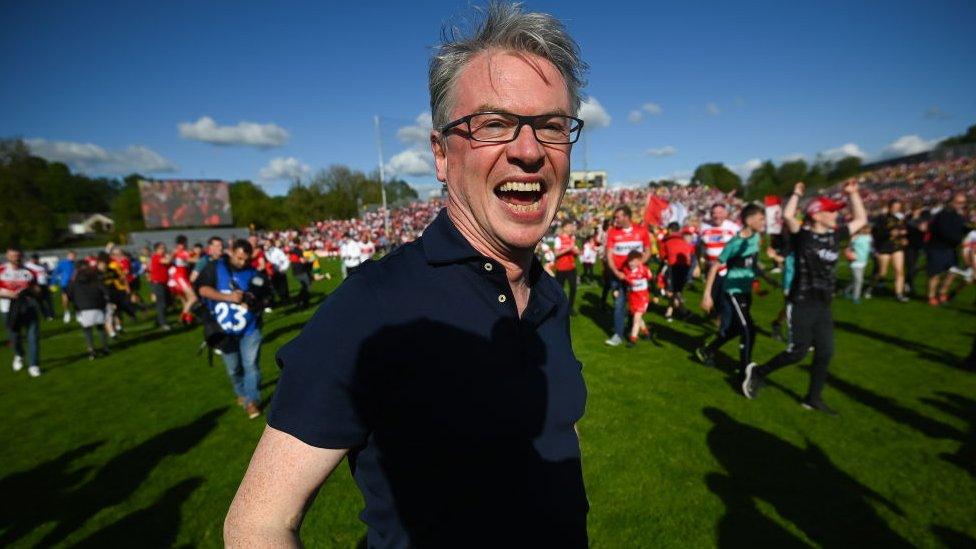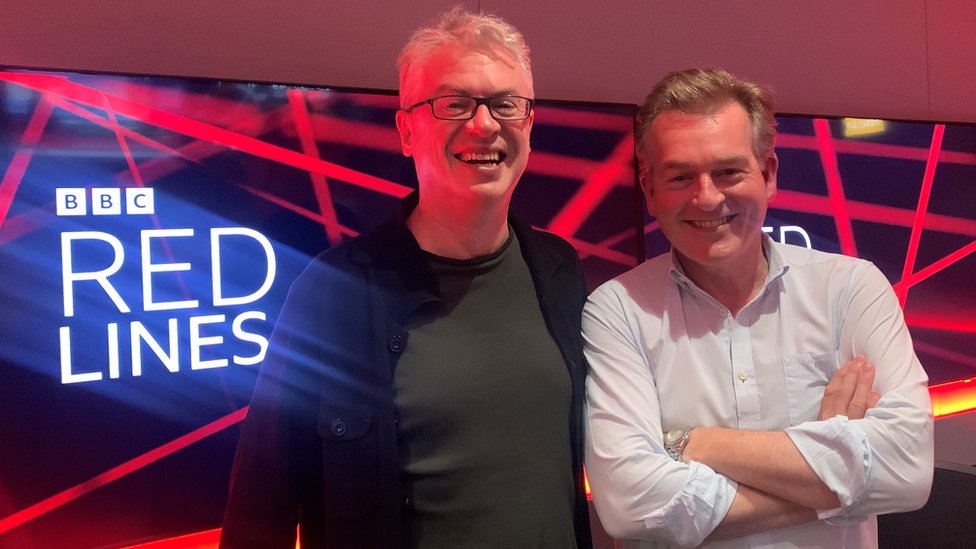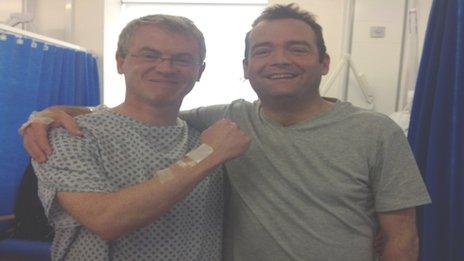Could Joe Brolly move from pundit to politician?
- Published

Former Derry footballer Joe Brolly says he could consider a new life in politics
Joe Brolly is a man with opinions - lots of opinions on lots of subjects. But even now, after decades in the public eye, he still manages to surprise.
The former GAA player, who now juggles careers as a criminal barrister and pundit, has told BBC News NI's Red Lines podcast that he would seriously consider standing for elected office - though as yet he has never been approached by any political party.
He tells me he feels, "as I get older... I could probably make a contribution".
Mr Brolly's parents were both elected representatives for Sinn Féin - his late father as an assembly member and his mother as a councillor in Limavady - but he maintains he has never voted for the party in his life.
He said he used to vote for the Women's Coalition, but at the last Westminster election he "voted for Claire Hanna, who I greatly like".
Acknowledging the potential for conflict between his larger than life personality and the need for politicians to stay on message, he said: "Whether I'd have the party discipline... is very questionable."
But despite that, he maintained: "As a person who is hooked into the world and empathetic to people and... blind in terms of religion and I hope has no prejudices - except against Tyrone - [I think] I would have a contribution to make politically."

Joe Brolly (l) playing for Derry in 1999
Pressed on whether he sees himself standing for election to Westminster or to Dáil Éireann (the Irish parliament), he is clear his real interest would ideally lie in elected politics in a new political dispensation.
"The Union is a fantasy," he said.
"The Brits don't care about the unionist people. They don't give a damn about them."
Mr Brolly was taking part in a special series of Red Lines interviews in which prominent figures - including Baroness Hoey, Eamonn McCann and the actor Ciarán Hinds - discuss their political awakenings and influences.
He discussed growing up in Dungiven in the 1970s and 1980s and the ever-present sense of "them and us" at the time.
"I can remember when Lord Mountbatten was blown up and I can remember the sense of triumph in the town... and if I'm not mistaken, 18 paratroopers were murdered on the same day... and again there was the sense of triumph around that."
But there's an important clarification: "For me, the taking of human life is abhorrent. I always hated violence."

Joe Brolly is the first guest in a special series of the Red Lines podcast with Mark Carruthers
The issue of how the conflict unfolded during the Troubles is one that is close to Joe Brolly's heart.
He described his father, Francie, as "a person of interest" to the authorities.
Mr Brolly Snr was interned in 1973 and was held in what was then Long Kesh Detention Centre for three years.
He was never charged with any offence but in 2005 he was arrested and questioned about the 1972 Claudy bomb in which nine people died. He was released without charge.
When I asked Joe Brolly if he ever confronted his father directly about the part he had played in the conflict, he suggested his father was always dismissive of the subject.
In December 2021, Mr Brolly told an interviewer he had donated his kidney to a man who went on to become a close friend "to atone for the taking of human life by people close to me".
Was he talking about his father?
He chooses his words carefully and speaks of several close family friends who had been involved with the IRA and had murdered people.
He moves on to talk about Fr Alec Reid and his futile attempts to save the two British corporals who drove into a republican funeral in west Belfast in March 1988.
He mentions the iconic photograph of Fr Reid on his knees beside one of the bodies - and he's struggling to get his words out.
It was, he says tearfully, "a terrible waste of human life".
Many people feel as if they know Joe Brolly - from his years of GAA punditry and from his popular weekly newspaper columns and podcasts - but this conversation catches him in a different light. There is less bravado and more baring of the soul.
Maybe he really is contemplating that move into elected politics after all.
You can listen to Joe Brolly's Red Lines interview in full on BBC Sounds.
Related topics
- Published6 October 2012
